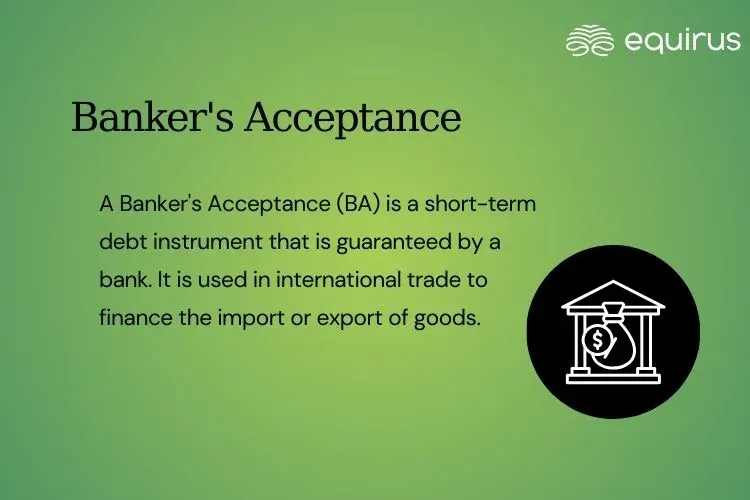Banker's Acceptance

Key Highlights
-
A Banker's Acceptance (BA) is a short-term debt instrument that is guaranteed by a bank.
-
Key features includes short-term, bank-guaranteed, trade-related and negotiable.
What is a Banker's Acceptance?
A Banker's Acceptance (BA) is a short-term debt instrument that is guaranteed by a bank. It is used in international trade to finance the import or export of goods. Essentially, it is a time draft that a bank promises to pay at a future date, making it a safe and trustworthy form of payment for both the buyer and the seller.
How It Works?
1. Trade Agreement
Two parties — usually from different countries agree to a trade. The buyer doesn’t pay immediately but instead agrees to pay after a certain time, say 90 days.
2. Issuing a Time Draft
The buyer draws a time draft (a written promise to pay) in favor of the seller.
3. Bank Guarantee
The buyer’s bank “accepts” the draft, meaning it guarantees the payment on the due date. This accepted draft becomes a Banker’s Acceptance.
4. Seller Receives Payment Early
The seller can hold the BA until maturity or sell it in the secondary market (often at a discount) to get immediate cash.
Key Features
1. Short-Term: Usually matures within 30 to 180 days.
2. Bank-Guaranteed: Payment is guaranteed by a reputable bank, reducing credit risk.
3. Trade-Related: Mostly used in international trade transactions.
4. Negotiable: Can be sold or transferred in the secondary market.
Example
Let’s say an Indian importer agrees to buy goods worth ₹50 lakhs from a US exporter, with payment due in 90 days. The Indian importer’s bank accepts a time draft and promises to pay the US exporter ₹50 lakhs after 90 days. This draft is a Banker’s Acceptance. The US exporter can either wait 90 days or sell the BA in the financial market to get money sooner.
Why Is It Used?
For Exporters:
-
They get a guaranteed payment from a reliable bank.
-
They can sell the BA for cash without waiting for maturity.
For Importers:
-
They get time to pay, which helps with cash flow.
-
It helps them build trade relationships without immediate cash outflow.
Benefits of a Banker’s Acceptance
1. Lower Risk: Since the bank promises to pay, the risk of default is very low.
2. Liquidity: BAs can be sold in the secondary market for quick funds.
3. Improves Trade Efficiency: Encourages international trade by building trust between unfamiliar parties.
Risks Involved
1. Bank Risk: If the accepting bank fails, the payment might be at risk.
2. Market Risk: If sold before maturity, the BA might fetch less than face value.
3. Exchange Rate Risk: In international trades, currency fluctuations can affect the final settlement.
Who Uses Banker's Acceptances?
-
Exporters and Importers
-
Multinational Companies
-
Banks and Financial Institutions
-
Investors seeking low-risk, short-term instruments
